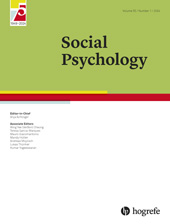Zivilcourage und Hilfeverhalten
Abstract
Zusammenfassung: In der vorliegenden interkulturellen Studie werden die mentalen Repräsentationen der Konstrukte “Zivilcourage” und “Hilfeverhalten” untersucht. Es wird überprüft, ob prosoziales Verhalten eher als zivilcouragiert bezeichnet wird, wenn der Akteur negative soziale Konsequenzen zu erwarten hat, wogegen die Zuschreibung von Hilfeverhalten unabhängig von den antizipierten negativen sozialen Konsequenzen auftreten sollte. Probanden aus Deutschland und der Ukraine erhielten vier Szenarien, in denen das prosoziale Verhalten einer Person dargestellt wurde. Diese Person hatte entweder hohe oder niedrige negative soziale Konsequenzen zu erwarten. Die Probanden gaben für jedes Szenario an, inwieweit es sich beim dargestellten Verhalten um Zivilcourage bzw. um Hilfeverhalten handelt. Wie erwartet wirkte sich die Manipulation der antizipierten negativen sozialen Konsequenzen nur auf die Zuschreibung von Zivilcourage, nicht aber auf die Zuschreibung von Hilfeverhalten aus.
Abstract: In the present cross-cultural study, the mental representations of civil courage and helping behavior are compared. It is investigated whether prosocial behavior is designated as civil courage if the actor has to expect negative social consequences, whereas the judgment of helping behavior is not related to the anticipated negative social consequences. Subjects from Germany and the Ukraine received four scenarios in which an actor showed pro-social behavior. This person had to expect either high or low negative social consequences. For each scenario, the participants assessed the behavior described regarding its extent of civil courage and helping behavior. As expected, the manipulation of anticipated negative social consequences only affected the ratings of civil courage but not the ratings of helping behavior.
References
Batson, C.D. (1998). Altruism and prosocial behavior.. In D.T. Gilbert, S.T. Fiske & G. Lindzey (Eds.), Handbook of social psychology (4th ed., Vol.2, pp.282-316). New York: McGraw-Hill/Oxford University Press. .Bierhoff, H.-W. (2002). Theorien hilfreichen Verhaltens.. In D. Frey & M. Irle (Hrsg.), Theorien der Sozialpsychologie (Bd.II, S.178-197). Bern: Huber. .(2002). Das große Wörterbuch der deutschen Sprache. . Mannheim: Duden. .
Frey, D. , Neumann, R. , Schäfer, M. (2001). Determinanten der Zivilcourage und des Hilfeverhaltens.. In H.W. Bierhoff & D. Fetchenhauer (Hrsg.), Solidarität, Konflikt, Umwelt und Dritte Welt (S.93-122). Opladen: Leske & Budrich. .Hong, Y.Y. , Chiu, C.Y. , Dweck, C. , Lin, D.M.S. , Wan, W. (1999). Implicit theories, attributions, and coping: A meaning system approach.. Journal of Personality and Social Psychology, 77, 588– 599 .Krebs, D. (1975). Empathy and altruism.. Journal of Personality and Social Psychology, 32, 1134– 1146 .Meyer, G. , Hermann, A. (2000). Zivilcourage im Alltag. Ergebnisse einer empirischen Studie.. Politik und Zeitgeschichte, 7-8, 3– 13 .Piliavin, I.M. , Piliavin, J.A. , Rodin, J. (1975). Costs, diffusion and the stigmatised victim.. Journal of Personality and Social Psychology, 32, 429– 438 .Piliavin, J.A. , Dovidio, J.F. , Gaertner, S.L. , Clark, R.D., III. (1981). Emergency intervention. . New York: Academic Press. .Scheele, B. , Kapp, F. (2002). Utopie Zivilcourage: Zur Integration von Fürsorgemoral und öffentlichem Handeln.. Kölner Psychologische Studien, VII, 2002–



